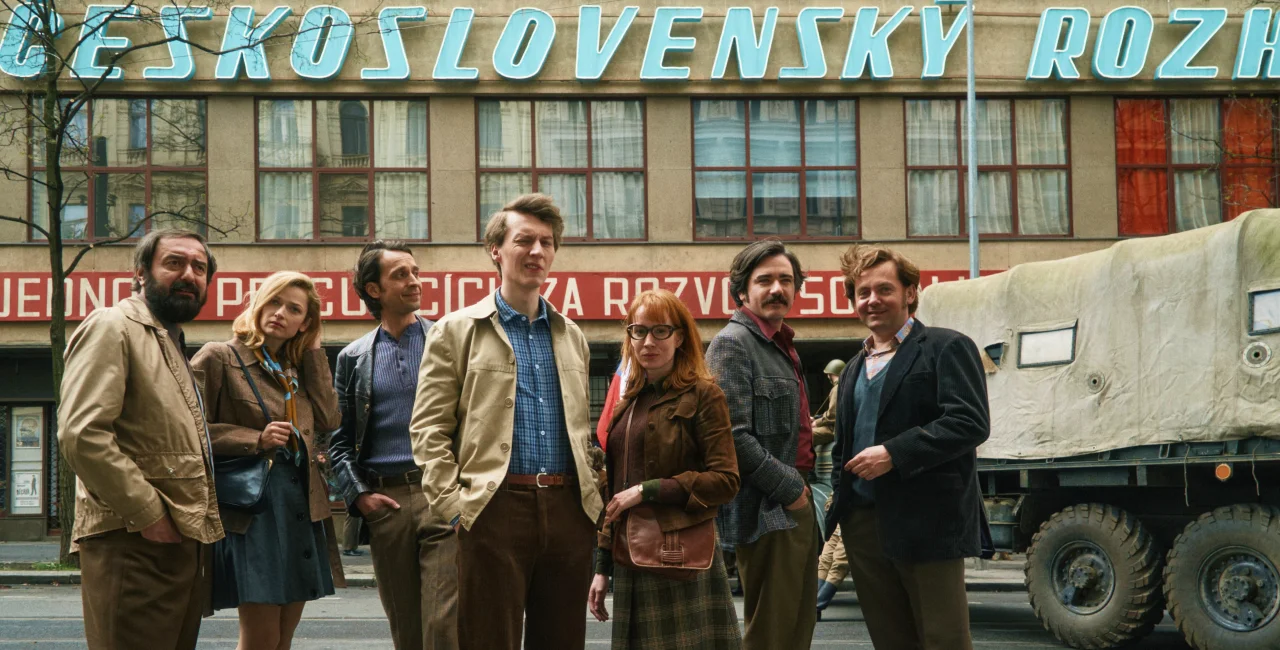On Aug. 20-21, 1968, Soviet-led Warsaw Pact troops invaded Czechoslovakia, abruptly ending the Prague Spring reform movement. The invasion, which resulted in over 100 deaths, marked the onset of a two-decade occupation, leading to widespread political repression, mass emigration, and the tragic quashing of a nation’s hope for freedom.
As tanks rolled into Prague, unarmed civilians gathered outside Czechoslovak Radio on Prague’s Vinohradská Street, trying to prevent enemy troops from taking control. The station would became a symbol of resistance and the focal point of the invasion.
A newly released Czech thriller Waves (Vlny in Czech) takes audiences back to the turbulent events of the Prague Spring and the subsequent Warsaw Pact invasion of Czechoslovakia. The story focuses on the months leading up to the rebellion, a pivotal moment in Czech history. Directed by actor and filmmaker Jiří Mádl, the film had its world premiere at the 58th Karlovy Vary International Film Festival, winning the audience award.
Behind the scenes of a pivotal moment in history
At the story’s core, the international editorial offices at Czechoslovak Radio, led by venerable journalist Milan Weiner, alongside journalistic icons, including Věra Šťovíčková, Jiří Dienstbier, Luboš Dobrovský, and Jan Petránek.
"Radio was an influential medium, listened to by everyone. It was the Facebook or Instagram of its time. Although the power of surveillance was pervasive, a group of people showed the courage to confront and stand up to the army during one of the most iconic moments in our modern history, leading to a memorable broadcast at a time when tanks were rolling through Prague," said Mádl.
Jiří Mádl, director of Waves“Personal meetings with the original editorial staff members were crucial in my decision to embark on [the film]. The narratives of the International Life of the Czechoslovak Radio, which was then headed by Milan Weiner, provided me with a profound sense of being there with them.”
The film focuses on Tomáš, a young man who takes a job as a technician in the tense atmosphere of the pro-democracy newsroom and soon realizes that the State Security (StB) is monitoring the editors. This leads him into a high-stakes situation involving a crucial recording.
The cast includes Vojtěch Vodochodský as Tomáš, Táňa Pauhofová as Věra Šťovíčková, and Stanislav Majer as Milan Weiner. The score was composed by British musician Simon Goff, a Grammy winner who previously worked with Icelandic composer Hildur Guðnadóttir on projects like Joker and Chernobyl.
Mádl, who was inspired by real journalists including Petránek and Šťovíčková, skillfully blends historical footage with new scenes reminiscent of Peter Jackson’s They Shall Not Grow Old film. He has also cited the American film Argo, directed by Ben Affleck, as an influence.

But Mádl also says the film, which takes the viewer behind the scenes of the community born inside the broadcasting studios, is about brothers; apolitical Tomáš is raising his teenage brother Pavel amid the turning point of the so-called Prague Spring when Moscow sent tanks to Prague to restore censorship and the old order.
Czechoslovakia at the end of the 1960s was a time of change, a time of new attitudes and a time of resistance to the ossification of the old. People’s desire to live freely and according to their own ideas was reflected not only in politics but also in fashion, music, and design.
“Through the fate of the two brothers, I tried to capture the atmosphere of the 1960s so that the viewer could feel its turbulence and perhaps even the fear that is still under our skin today but can be faced,” said Mádl.
Previously unseen footage used
The original footage of the editorial staff was mostly destroyed. However, the filmmakers found archival video materials containing unseen, authentic footage of the people who filmed the events at the radio building in August 1968. To enhance the archive footage, the filmmakers utilized artificial intelligence to colorize it. They also re-shot specific sections with actors to complement the original footage.
“The moment in Waves when the story connects with the real events when the Russians invaded is so suspenseful that I was making sure which were ours after the scene. I was wrong, too, [about] which [ones] we shot and what was archival,” says the film’s producer, Monika Kristl of Dawson Films.
The crew added authenticity to the film by shooting in Prague locations. Viewers will recognize the building of today’s Czech Radio as well as Nerudova Street under Prague Castle, where thousands of students are seen attending a candlelight march during the film’s opening. The scene depicts a pivotal moment when a student protest meant to highlight the lack of water, heat, and electricity in dormitories turns into a significant social event with political implications.

The demonstration was brutally dispersed by police, but the aggressive crackdown had unforeseen consequences. It became the subject of the first open reporting on police behavior in the press, foreshadowing the reform process.
“The students had no idea what they were setting in motion. The intervention was intended to intimidate them, but instead, it galvanized them. They found an advocate in Milan Weiner on the radio, who was as influential then as [Facebook founder] Mark Zuckerberg might be today,” said Mádl, underscoring the scene’s importance.
As Waves revisits the Prague Spring and the Soviet invasion of 1968, it does more than recount history—it forges a powerful connection with the present and reminds viewers that history’s lessons are ever relevant.
Waves, which was just released in cinemas nationwide on Aug. 15, can be seen with English subtitles in Prague at Kino Lucerna (all showings after 7 p.m. have English subtitles), Kino Světozor, Kino Pilotů, and Edison Film Hub.












 Reading time: 4 minutes
Reading time: 4 minutes 


























